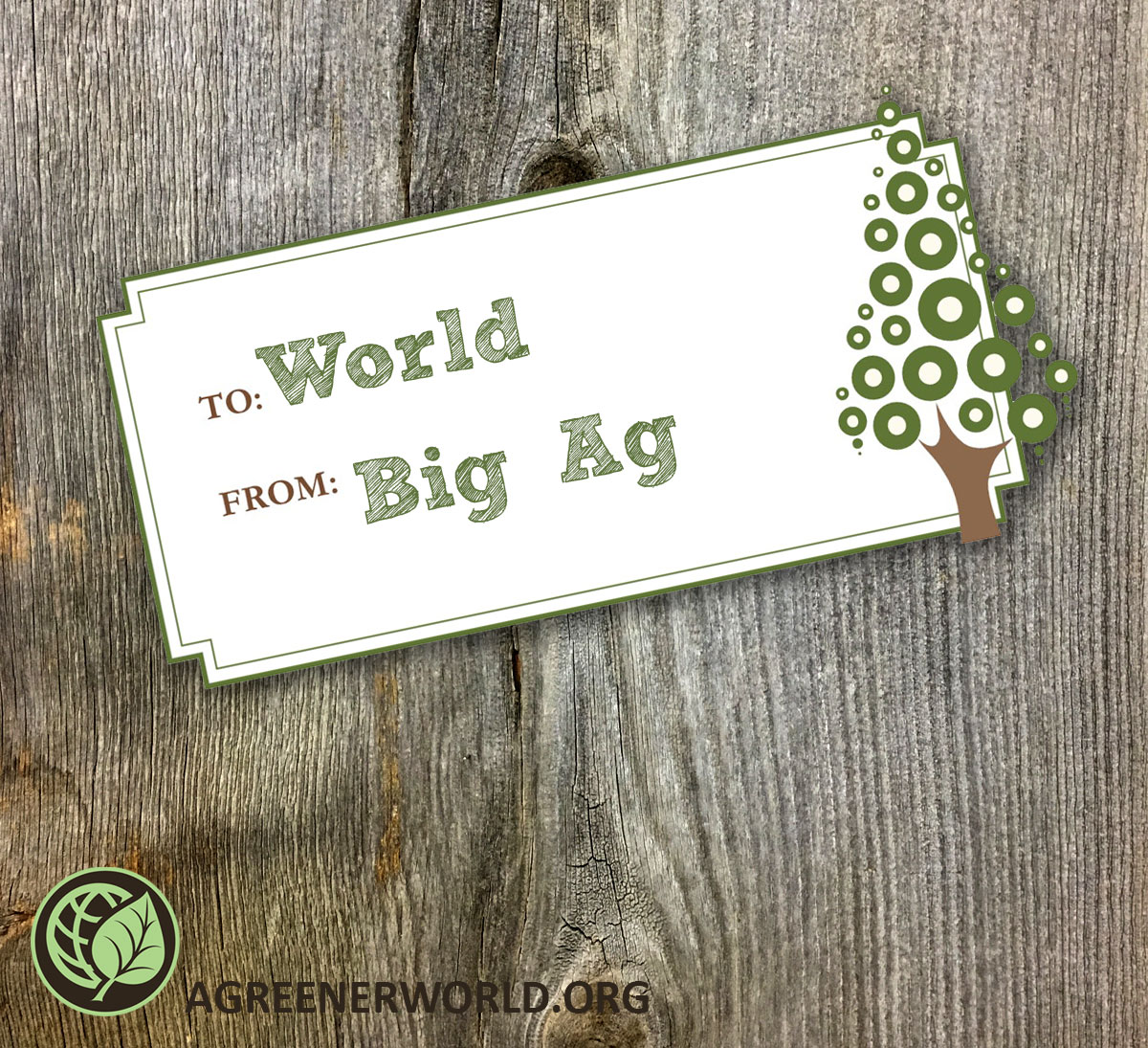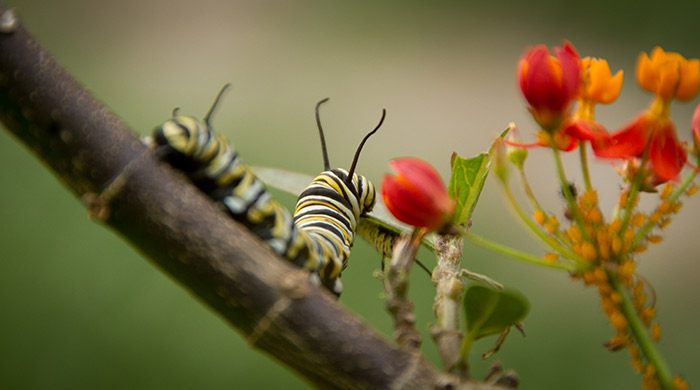At A Greener World, we have an annual tradition counting down the top ‘gifts’ we’ve…

Big Ag’s Gifts for 2018
Our tradition continues this holiday season as we remind ourselves of the many “gifts” Big Ag has provided us in the last 12 months. Can we return to sender?
Here’s our top five for 2018.
#5 – Big Ag Keeps Getting Bigger
Although the U.S. has anti-monopoly laws, they’re apparently not strong enough to prevent some of the world’s largest agricultural giants, Bayer and Monsanto, to merge as part of a $66 billion-dollar deal. Prior to the merger, the U.S. Justice Department required both companies to sell off some of their assets, so they wouldn’t have complete control over every aspect of their seed and agrochemical proprietary information and products. This requirement from the department was an attempt to prevent the company from gauging farmers and consumers. However, among critics of the merger, there is major concern that prices for both farmers and consumers will increase, and farmers dependent on their products will be left with limited options. In a time when Big Ag threatens total domination—let’s choose to opt-out of their systems and instead support independent farmers and verified sustainable farming practices, now officially more important than ever!
#4 – Monsanto’s Cancer-Causing Weedkiller
The giant agrochemical company, Monsanto, was in the headlines again after being found guilty of not disclosing the cancer-causing properties of their billion-dollar herbicide product, Roundup–even though in 2015 the International Agency for Research on Cancer (IARC) found the primary ingredient (glyphosate) in the herbicide to be a probable carcinogen. A former groundskeeper, Dewayne “Lee” Johnson, alleged that Roundup was responsible for his diagnosis of non-Hodgkin lymphoma (NHL) and sued the behemoth. A jury agreed, unanimously deciding the herbicide caused Johnson’s terminal medical condition and awarding him $289 million-dollars (Monsanto has appealed). There have been thousands of other lawsuits filed against Monsanto, but in this case, the company’s own internal documents clinched the verdict; proving Monsanto had full awareness of the dangers of their product. This landmark case is expected to have far-reaching implications. Tragically, Johnson may not live to see its resolution.
#3 – Surprise, Surprise: The Organic Welfare that Wasn’t
In March, the USDA National Organic Program (NOP) withdrew their proposed “improvements” to Organic animal welfare standards. Broadly supported by farmers and consumers, the proposed Organic Livestock and Poultry Practices (OLPP) ruling would have required minimal improvements in living conditions, animal healthcare, transport and slaughter. While the proposed changes were by no stretch meaningful, they were a (very small) step forward on a long road toward meeting consumer and farmer expectations. In its rationale for the withdrawal the USDA claimed current regulations are “effective.” We ask: effective for whom? The status quo is certainly effective for Big Organic to continue making a premium on low-welfare products, but the standards are barely better for the environment, society or animals. Despite decades of public debate and outcry, the NOP is still not living up to consumer (or farmer) expectations on animal welfare, which is why many Organic farmers turn to A Greener World certifications to validate their high-welfare practices. For more information, read our blog on the topic here.
#2 – False Production Promises
Increasingly consolidated industrial multinationals (like the newly merged Bayer-Monsanto) claim they are essential to feeding an ever-growing population of humans. In fact, the farming systems promoted by Big Ag require an ever-growing use of fossil fuels and other inputs and aren’t feeding people in a sustainable or nutritious way. All the while, our resource-strained planet is suffering dire consequences. From a recent UN Food and Agriculture Organization (FAO) report, the answer is not more GMOs, agrochemicals and environmental degradation, but an agroecological approach to food production, like the systems promoted by A Greener World. The report concluded that industrial agriculture is leading our planet and humans astray – by taking a costly toll on our health, the environment, biodiversity, animal welfare, rural economies and farming families. Supporting AGW-certified products is a concrete way to support agroecological farming systems and begin saving the world with your fork! For more information check out our blog, How to Save The World With Your Fork.
#1 – Lab Meat: What’s In It For Us?
With all the misleading, over-simplified, and just plain wrong information floating around about meat production, it’s no wonder that consumers are looking for new “better meat” options. This year we’ve seeing an influx of companies promoting lab-grown meat as a “clean” alternative. However at this stage, we don’t even know if the product is safe, its carbon footprint, its impact on animal welfare or corporate consolidation of the food supply, or even whether we’ll know when we eat it—the labeling rules still have to be worked out. While we wait for this “gift” to be slowly unwrapped, we at A Greener World will continue to shout from the rooftops that not all meat is created equally, that there are innovative, sustainable ways to raise animals, and those interested in supporting high-welfare, environmentally sustainable systems, need only seek out AGW-certified products to get real meat that provides real change, right now.
There is Hope! Looking Ahead to A Greener World
Since the return policies on the negative Big Ag gifts are non-refundable, here at A Greener World we like to focus on the positive impacts we can make daily. The everyday choices in our food purchasing can have measurable and beneficial impacts on the environment, society, animals (both wild and farmed), as well as for rural economies and communities. Choose AGW-certified products and be assured your food choices are promoting positive farming solutions!
Happy New Year,
A Greener World


